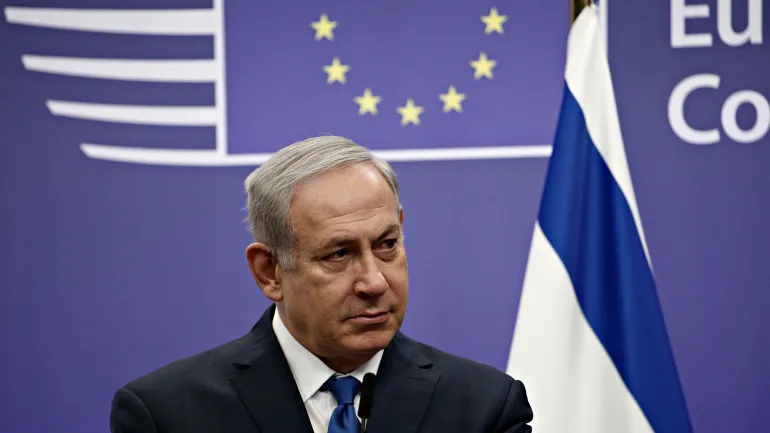EU-Israel agreement review: saving face without changing position


The decision to review the association agreement between the European Union and Israel illustrates an underlying problem that Brussels had consigned to silence: the Israeli narrative on the war in Gaza no longer stands up. Yet there is no indication that the review will lead to a change in the European position on Israel. If this symbolic step is to signify anything more than a bid to save face, the review must be accompanied by hard-hitting measures.
As timid as it might seem, the announcement by the EU’s new top diplomat, Kaja Kallas, to review the EU-Israel association agreement amounts to the most meaningful action taken by Brussels in nearly 20 months of Israeli offensive on Gaza, especially when set against its previous inaction. On the face of it, the trigger appears to have been the tightening of the Israeli blockade of Gaza since March 2nd, along with the new military offensive in the Strip. Brussels’ announcement comes amid a mounting chorus of criticism from European countries. In the space of just a few weeks, the Netherlands formally requested the review from the EU; the United Kingdom suspended trade talks with Israel; and Canada, France and the UK threatened to take “concrete actions” – without specifying what they would be – should Israel continue what they called its “egregious actions”.
With that in mind, how do we explain why a measure sought by Spain and Ireland over a year ago (and met with no reply) should be activated now? The main reason is the absence of a common position on the war in Gaza within the EU. Since the attacks of October 7th, 2023, Israel has had the unconditional backing of European states such as Germany, Austria, Italy, the Czech Republic and Hungary, who have blocked any attempt to bring pressure to bear on the Israeli government. The EU, then, has confined itself to a litany of communiqués expressing its “disquiet” and “concern” over an asymmetric war which is pitting a military superpower against a besieged civilian population, while failing to accompany such statements with any concrete measure.
This time, however, 17 member states have decided to back the review of the agreement on the grounds that Article 2 makes relations between the EU and Israel conditional on respect for human rights. This change of stance may be down to the scale of the humanitarian catastrophe: the blockade imposed by Israel since March 2nd has plunged half a million Palestinians into a state of catastrophic famine, while the intensification of the bombardments is causing dozens of deaths every day. Faced with the unbearable images circulating in the media and on social networks, even countries that traditionally align with Israel such as Austria, Slovakia or Poland have chosen to back the proposal in view of the flagrant violations of international humanitarian law.
But there is another, deeper reason for this change of position, one which is increasingly evident and which the EU can no longer ignore: the crimes committed by the Israeli army in Gaza can no longer hide behind the argument of the “right to self-defence”. The narrative of Benjamin Netanyahu’s government has revolved around two points: the eradication of Hamas and the freeing of the Israeli hostages taken on October 7th. Yet after months of military offensive that has claimed the lives of over 53,000 Palestinians – most of them civilians – this justification has lost its legitimacy. For one thing, Hamas has largely been neutralised as a direct military threat, just as Hezbollah and various militias in Syria and Iraq have been debilitated. For another, diplomacy has proven to be the most effective means of freeing the hostages, as the exchanges negotiated with the mediation of Qatar and Egypt have shown. The facts, then, have laid bare the contradictions of the self-defence narrative: the Israeli military campaign, officially aimed at restoring Israel’s security, is a collective punishment that has resulted in war crimes, crimes against humanity and incitement to genocide, according to Amnesty International. All in the service of a broader and increasingly explicit goal: the recolonisation of Gaza.
In this regard, Europe’s shift is also due to a factor that it is increasingly difficult to ignore: the radical change in the official Israeli discourse makes the silence Brussels has kept until now untenable. Unlike in the first phases of the war waged since October 7th, the members of the Israeli government no longer make any secret of their desire to drive out the Palestinian population and recolonise the territory, rather they proclaim it quite openly. The finance minister, Bezalel Smotrich, has gone as far as to state that it may be “justified and moral” to starve the Gazans to death and has urged keeping up the Israeli blockade of Gaza and expelling its residents to other countries. Likewise, the deputy speaker of the Israeli parliament has directly called for the elimination of the adults in the Strip. These statements are not anecdotal; they constitute admissions of genocidal intent and a desire to carry out ethnic cleansing. The Office of the Prosecutor of the International Criminal Court, in fact, has formally accused Netanyahu and the defence minister, Yoav Gallant, of war crimes and crimes against humanity. The United Nations too has accused Israel of inflicting conditions of life that could constitute genocide. In other words, it is no longer simply about neutralising Hamas and bringing home the Israeli hostages. What is underway, according to these statements and reports, is a strategy to empty Gaza of its population and annex the territory.
Given this situation, the risk that the EU and its member states may be considered complicit in war crimes, ethnic cleansing and even genocide is now clearer than ever. In the field of justice, in February 2024 a Dutch court banned the export of parts for F-35 aircraft used by Israel. Just two months later, in April last year, Nicaragua instituted proceedings against Germany at the International Court of Justice over breaches of the Genocide Convention because of its military support for Israel.
Given the extremely serious situation, rather than a forceful response, the review of the EU-Israel association agreement looks more like a modest, symbolic gesture designed to give the impression that Brussels disassociates itself from the actions of the government in Tel Aviv. First, because the EU continues to approach this conflict as if were solely a humanitarian crisis, thus sidestepping the debate on its tacit support for Israel. As things stand, the next prescribed step is for the European Commission to determine whether Israel is violating human rights and democratic principles, something that was already evident before October 7th, and all the more so now. The process could drag on for weeks or months, while the massacres continue in the Strip. Second, because the debate in Brussels completely precludes the use of truly effective tools to exert pressure, such as an arms embargo – which respect for international law mandates – or formal backing for South Africa’s case against Israel at the International Court of Justice for “genocide” in Gaza.
In other words, only if this review is accompanied by measures comparable to those adopted against Russia after the invasion of Ukraine – economic sanctions, severance of diplomatic relations, support for international judicial initiatives – will we be able to speak of a true change of position. Otherwise, the EU will remain ensnared in its double standard, perpetuating the erosion of its already diminished moral standing.
Keywords: Israel, Gaza, EU, association agreement, human rights, famine, humanitarian catastrophe
All the publications express the opinions of their individual authors and do not necessarily reflect the views of CIDOB or its donors